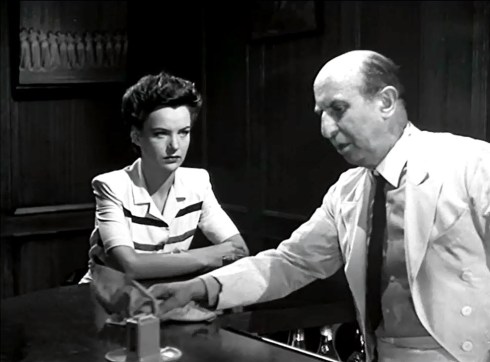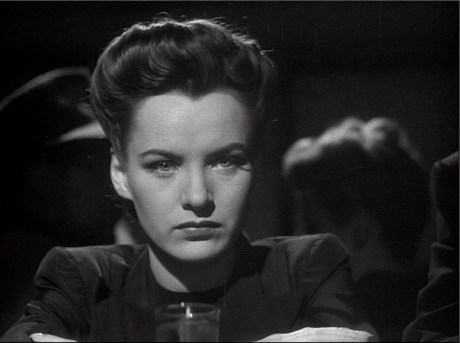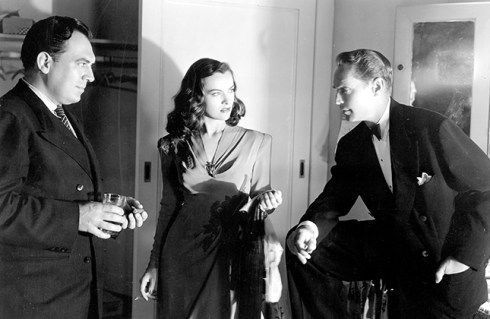
There’s a peculiar melancholy that lingers in the shadows of 1940s suspense cinema—a decade when the world seemed poised on a knife’s edge. The silver screen became a mirror for our deepest anxieties and desires. These films do so much more than simply entertain: they wrap us in a velvet shroud of uncertainty, where every footstep echoes with suspicion. Every silhouette threatens to dissolve into menace. They’re films spun from the fevered minds of visionary directors like Alfred Hitchcock, Fritz Lang, Robert Siodmak, and Jacques Tourneur, whose names became synonymous with the undercurrent of unease and tension, psychological intrigue, and atmospheric storytelling.
When I think about what makes 1940s suspense so compelling, often entering into noir territory, I always end up circling back to Robert Siodmak and Jacques Tourneur. Both directors had such a distinctive touch, but their approaches to tension and atmosphere were uniquely their own.
Robert Siodmak left a significant mark on cinema, blending noir atmosphere with psychological depth. He was a master of shadow and suspense, and you can see his roots in German Expressionism all over his films. He used black-and-white cinematography and urban landscapes not just for style, but to create a mood where darkness and light almost become characters themselves.
His films are packed with high-contrast lighting, inventive camera angles, and a sense of claustrophobia. He sets a mood that wraps the narrative in an airless vise like walls closing steadily around the story, unsettling and persistent.

Siodmak’s Phantom Lady starring Thomas Gomez, Ella Raines, and Franchot Tone.
Siodmak loved intricate, sometimes non-linear narratives—think of how The Killers unfolds through flashbacks, or how Criss Cross twists around on itself with betrayals and doomed romance. His characters are rarely straightforward heroes or villains; instead, they’re flawed, morally ambiguous, and often trapped by fate. Some of his best work includes noir masterpieces like The Killers 1946 and Criss Cross 1949, and suspenseful classics like Phantom Lady 1944 and The Spiral Staircase 1946—with Dorothy McGuire’s Helen navigating the labyrinth of shadows and peril—stand as cornerstones in the canon of suspense cinema, helping to define the genre’s enduring legacy of psychological complexity, visual innovation, and atmospheric dread.
Jacques Tourneur, on the other hand, brought a supernatural and Gothic edge to the genre. He was all about atmosphere and suggestion. He had this gift for making you feel like something terrifying was lurking just out of sight, using shadows, mood, and sound to let your imagination fill in the blanks. In his horror films—like Cat People 1942, I Walked with a Zombie 1943, and The Leopard Man 1943—he cultivates a cinematic spirit where the supernatural is always ambiguous, hovering just beyond the grasp of certainty.

James Bell and Jean Brooks in The Leopard Man 1943.
The sense of “the uncanny” is central: his films obscure any concrete visual cue, leaving us suspended between rational explanation and the possibility of something otherworldly. He rarely showed the threat outright, which somehow made things even more frightening.
Even when he shifted to noir with Out of the Past 1947, he brought that same sense of ambiguity and unease, blending hard-boiled crime with an almost ghostly mood. Tourneur’s camera work was elegant and fluid, and he had a real knack for subtle storytelling, leaving things unsaid, allowing us to draw our own conclusions. His best films (Out of the Past, Cat People, I Walked with a Zombie, Night of the Demon) are masterpieces of mood and restraint, proving that sometimes what you don’t see is even more powerful than what you do.
Both directors left a huge mark on suspense and noir, but in very different ways: Siodmak through his brooding, fatalistic cityscapes and tangled plots, and Tourneur through his poetic minimalism and haunting, ambiguous worlds.
Alfred Hitchcock stood at the high point of this thrilling movement— his American debut with Rebecca (1940), followed by Foreign Correspondent (1940), Suspicion (1941), Saboteur (1942), Spellbound (1945), and Notorious (1946). And one of Hitchcock’s most suspenseful works of the 1940s, Shadow of a Doubt (1943), with its chilling portrait of small-town innocence corrupted by Joseph Cotten’s unforgettable Merry Widow killer, Uncle Charlie. Hitchcock’s sensibility helped define the modern suspense film, blending ordinary protagonists, in seemingly ordinary situations, who find themselves mixed up with extraordinary danger.

Teresa Wright in Alfred Hitchcock’s suspense masterpiece Shadow of a Doubt 1943.
These directors dominated the suspense scene with pioneering cinematic techniques that heightened audience anxiety. I always marvel at how Hitchcock could make even the most mundane moments feel loaded with dread—he really knew how to keep us all on edge.
Honestly, I find myself endlessly drawn back to the suspense films of the 1940s—they just have this magnetic pull. Every time I revisit one, there’s that familiar jolt of excitement, like stepping into a world where danger is always just out of sight. The atmosphere is impossible to shake: shadows that seem to conspire, and a sense that every corner hides someone with sinister intentions. There’s something so compelling about watching depraved or nefarious characters weave their schemes while unsuspecting victims edge ever closer to peril. It’s that constant dance between predator and prey, menace and vulnerability, that keeps me hooked and makes these films feel so alive and unnerving. Suspense is painted with a palette of chiaroscuro, their stories flickering between light and shadow, hope and doom.
Fritz Lang was another towering figure. He brought his German Expressionist sensibilities to Hollywood and delivered classics like Man Hunt (1941), Ministry of Fear (1944), Secret Beyond the Door (1947), The Woman in the Window (1944), and Scarlet Street (1945). Lang’s films were marked by shadowy visuals, moral ambiguity, and a deep sense of fatalism.

Laird Cregar in Brahm’s The Lodger 1944.
John Brahm (Hangover Square, 1945; The Lodger, 1944) also contributed iconic suspense films that remain influential. Carol Reed’s Night Train to Munich (1940) and later The Third Man (1949) showcased British suspense at its finest, blending espionage with psychological tension. Alongside these luminaries, the decade was rich with directors who worked more quietly or off the beaten path, crafting understated or cult-favorite suspense thrillers. Mark Robson delivered the eerie The Seventh Victim (1943), a film that has grown in reputation for its ambiguous, atmospheric horror.

Carol Reed’s The Third Man starring Orson Welles as Harry Lime.
André De Toth’s Dark Waters (1944) offered a Southern Gothic take on suspense, while Stuart Heisler’s Among the Living (1941) explored madness and mistaken identity in a moody, underseen gem. Delmer Daves’ two superb 1947 gems – Dark Passage (1947), starring Humphrey Bogart and Lauren Bacall is a suspenseful thriller about a man falsely convicted of his wife’s murder who escapes from prison and goes on the run to prove his innocence, aided by a mysterious woman, and The Red House a psychological mystery starring Edward G. Robinson and Judith Anderson, that centers on a secluded farmhouse, a mysterious red house in the woods, and dark family secrets that gradually come to light.
Joseph H. Lewis’s My Name Is Julia Ross (1945) is another compact, chilling entry, now celebrated for its taut direction and psychological depth. British directors also contributed to the genre’s richness. Norman Lee’s The Door with Seven Locks (1940) is a prime example of the “old dark house” thriller, and Thorold Dickinson’s Gaslight (1940) (the original British version) remains a masterclass in psychological manipulation and dread. There’s also George Cukor’s 1944 version of Gaslight starring Charles Boyer and Ingrid Bergman. Boris Ingster’s Stranger on the Third Floor (1940), though initially overlooked, is now recognized as a foundational film in both suspense and noir, with its surreal visuals and Kafkaesque atmosphere. Mexican director Roberto Gavaldón contributed with films such as La otra (The Other One 1946), a suspenseful tale of twins, murder, and identity. Starring Dolores del Río, La otra was later remade by Warner Bros. as Dead Ringer (1964) starring Bette Davis.

“A life that should have been but never was! A fate that moved on twisting and tortuous paths!”
– Dolores del Río, La Otra (The Other One)

Charles Boyer and Ingrid-Bergman in George Cukor’s Gaslight 1940.
Italian director Mario Soldati’s Malombra (1942) is a Gothic thriller with psychological suspense, featuring a haunted castle and a woman tormented by the past. Spanish director Edgar Neville stands out as the filmmaker most closely associated with suspense and crime thrillers in 1940s Spain. His film The Tower of the Seven Hunchbacks (La torre de los siete jorobados 1944) is a prime example—a fantastical mystery that plunges beneath the streets of old Madrid into a hidden world of intrigue, secret societies, and atmospheric menace.
The era’s thrillers-whether set in fog-choked London alleys, rain-soaked American mansions, or the labyrinthine byways of the mind-wove together noir’s bruised romanticism with the Gothic’s haunted longing all left their mark.
To revisit these films is to wander through that gallery of haunted rooms and rain-slicked streets, to step into a hall of mirrors, where every reflection is tinged with longing and every corridor leads deeper into uncertainty. Guided by directors who understood that suspense isn’t just about who did it or how—it’s about why we’re so drawn to the darkness at the edge of the frame. The legacy of 1940s suspense lies not just in its twists and revelations, but in the way these stories taught us to savor tension, to live inside the question, and to find beauty—even solace—suspensce is not just in the twists and revelations but in the way these stories taught us to savor the tension. It’s the melancholy art of not knowing what comes next.
The suspense thrillers of the 1940s were far more than products of their time—they were blueprints for the future, boldly blurring the lines between crime, horror, melodrama, and psychological drama. This willingness to experiment with genre boundaries opened the door to hybrid storytelling and tonal complexity. What makes these films so enduring isn’t just their style, but the way they tapped into the anxieties and shifting social landscape of their era, layering narrative daring with emotional depth and visual invention.
At their heart, these films revolve around recurring themes that resonate as strongly now as they did then. The “innocent-on-the-run” motif—ordinary people ensnared in webs of danger, mistaken identity, or conspiracy—heightened suspense by placing vulnerable protagonists in unfamiliar, often threatening situations, as seen in Hitchcock’s Foreign Correspondent (1940).
There are recurring tropes of Psychological Manipulation and Gaslighting: Films like Gaslight (1944) explored the theme of psychological abuse and manipulation, often within domestic or romantic relationships. Films that include Hitchcock’s Suspicion 1941, Joseph L. Mankiewicz’s Dragonwyck 1946, and Douglas Sirk’s Sleep, My Love 1948. These stories delved into the erosion of sanity, the questioning of reality, and the power dynamics between abuser and victim, reflecting broader anxieties and inherent fear about trust and control.
Some stories dealt with Doomed Romance, Paranoia, Conspiracy, and Betrayal—the pursuit of the object of desire and the fatal consequences of passion or unrequited love became a staple theme. Shaped by the looming shadow of war, these stories have a sense of dread and moral ambiguity. At the same time, claustrophobic settings and the motif of “the trap” amplified the tension, both literal and psychological. The shadow of World War II and the emerging Cold War infused thrillers with a sense of paranoia and distrust.

Henri-Georges Clouzot’s Le Corbeau 1943.
Films like Rebecca 1940, Henri-Georges Clouzot’s Le Corbeau 1943, The Mask of Dimitrios 1944 directed by Jean Negulesco, Hitchcock’s Notorious 1946, and The Stranger (1946), directed by and starring Orson Welles, The Two Mrs. Carrolls 1947 directed by Peter Godfrey. Reed’s The Third Man 1949, like many plots, often revolved around espionage, hidden enemies, and conspiracies, blurring the line between friend and foe and tapping into the era’s fear of infiltration and betrayal.
Moral Ambiguity and the Blurring of Good and Evil: Claustrophobia and the Trap: Many suspense films used confined or oppressive settings- locked rooms, shadowy mansions, fog-bound cities- to create a sense of entrapment. The “structure of the trap” was a key motif, with suspense built around the hero or heroine’s efforts to escape both literal and psychological confinement—Delmer Daves’s The Red House 1947. We also see Psychological Struggle and Internal Conflict: The best thrillers of the era didn’t just pit their characters against external threats, but also explored their inner turmoil. Themes of mental instability, trauma, and existential dread ran through films like Spellbound (1945) and The Spiral Staircase (1946), and Sorry, Wrong Number 1948, directed by Anatole Litvak and starring Barbara Stanwyck, where the real enemy was often within.

Barbara Stanwyck in Anatole Litvak’s Sorry, Wrong Number 1948.
Quite often, there was Patriarchal Control and Vulnerable Women: Many thrillers, especially those with noir or Gothic elements, explored the vulnerability of women in a patriarchal system, highlighting themes of emotional control, manipulation, and the struggle for autonomy, as seen in Gaslight and similar films. Women in Hiding 1940, directed by Richard Thorpe, and Uncle Silas 1947 (released in the U.S. as The Inheritance) starring Jean Simmons. Experiment Perilous 1944 directed by Jacques Tourneur. Starring Hedy Lamarr, it is a Gothic suspense film in which Hedy Lamarr’s character is trapped in a mansion with a controlling, possibly murderous husband. The story revolves around a woman’s struggle to survive and assert her autonomy amid a suffocating, patriarchal household. There was Undercurrent 1946, directed by Vincente Minnelli, starring Katharine Hepburn as a new bride who becomes increasingly fearful of her husband’s dark secrets and controlling behavior. The film explores the dangers of male authority and the erasure of female agency within marriage.
Crime, Murder, and the “Whodunit” Puzzle: Many suspense thrillers center on the mystery of a crime, often murder, and the gradual unraveling of clues, red herrings, and secrets. The “whodunit” structure provided a framework for suspense and brought us into the obstacle course and the tension of the mystery.

Olivia de Havilland in a dual role in Robert Siodmak’s The Dark Mirror 1946.
And, of course, we can forget: Psychological and Psycho-Sexual Disturbance. Beneath the shadowy intrigue of 1940s suspense thrillers pulses a current of psychological and psycho-sexual disturbance, where repressed desires, fractured identities, and taboo obsessions drive characters to the brink of madness and violence. This captures both the psychological and the psycho-sexual elements- think of films like The Strange Love of Martha Ivers (1946), directed by Lewis Milestone, Fritz Lang’s Secret Beyond the Door 1947, Phantom Lady 1944, Spellbound 1945, The Dark Mirror 1946, and that same year, Hedy Lamarr would become the dark antiheroine in Edge G. Ulmer’s taut, The Strange Woman. Ulmer brought a distinctive, atmospheric touch to this tale of power, desire, and moral ambiguity. Also in 1946, there was John Brahm’s The Locket, where inner turmoil and forbidden impulses are as suspenseful as any external threat.
One of the most unforgettable images comes from Alfred Hitchcock’s Saboteur (1942), where the climactic confrontation atop the Statue of Liberty’s torch delivers a harrowing blend of vertigo and dread. As the real saboteur Norman Lloyd as the villain Frank Fry, clings desperately to the statue’s hand, we’re left breathless, suspended between sky and sea, in a sequence that remains a blueprint for tension in visual suspense.

Norman Lloyd as the villain Frank Fry in Hitchcock’s Saboteur 1942.
One of the most haunting moments in 1940s suspense comes courtesy of Dorothy McGuire as Helen in Robert Siodmak’s The Spiral Staircase 1946. There’s a particular sequence that has stayed with me: Helen, mute and utterly alone in the storm-battered mansion, senses the killer closing in. McGuire’s expressive eyes and trembling hands do all the speaking—her fear is so palpable it practically seeps off the screen. As Helen ascends the shadow-soaked spiral staircase, every twist of the banister seems to tighten the grip of dread, the candlelight flickering across her face as if the house itself is conspiring to keep her silent. The camera coils around her, mirroring her mounting panic, while thunder rattles the windows and the killer’s presence presses in from every dark corner. It’s a stroke of genius in Silent Terror: McGuire’s Helen, trapped between floors and fate, becomes the embodiment of vulnerability and resilience, and in that moment, you can’t help but hold your breath right along with her.
For this collection of suspense that lurks off the beaten path, I’m hoping you’ll join me in descending these winding staircases and wander through this particular hall of mirrors, as we honor the spellbinding legacy of 1940s suspense- a genre that, like a half-remembered dream, refuses to fade with the dawn.
Continue reading “Behind the Velvet Curtain: Unveiling 8 Hidden Gems of 1940s Suspense Cinema”














































